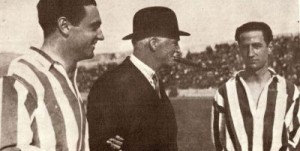
Considering the global appetite for European and particularly English football, it is often difficult and potentially even dangerous to try and determine whether the behaviour of the fanatical supporter seated next to you at your local watering hole is driven by a genuine affection for the game or a lifestyle choice born out of social compulsion. However, occasionally there are games that by their very nature facilitate the making of that distinction. Games which are rendered significant not by the hyperbolic pre-match bluster of television or the immediate consequence of the result but by historical context, and a certain nostalgia-tinged sense of occasion.
For Athletic Bilbao, the tie against Manchester United, besides representing their biggest European outing in years, is also steeped in historical significance. From the very spelling of their name, which was intentionally anglicized by the founders, the club’s ties with England are deep and binding.
Upon the construction of the iconic San Mamés stadium in 1913, the pitch was planted with English grass. A succession of English managers early in Athletic’s history inculcated a reverence for ‘la manera inglesa’ (the English way) to which the club has continued to adhere, despite the phrase being applied to vastly disparate qualities at different times. Among the most legendary figures in the club’s history is Fred Pentland, an Englishman nicknamed ‘El Bombín’ for the bowler hat without which he was seldom seen. Pentland was a much beloved character in Bilbao and enjoyed great success during two spells as Athletic’s manager between the wars. His side pioneered a brand of short-passing and possession-based football whose faint echoes reverberate around stadia in Spain to this day. In subsequent years Athletic’s ‘Englishness’ has been associated more with their doggedness and generally robust approach to the game.
The significance of this tie for the bilbaínos, however, extends beyond their collective anglophilia. Despite being one of Spain’s oldest and most successful clubs, they have not dined at Europe’s highest table for a significant while. In recent times they have been consistently outperformed in Europe by the likes of Sevilla and Villarreal, clubs without the historical gravitas of Athletic. The tie against the English champions is a return to the heady days of yore when Bilbao was a city of significance on Europe’s footballing map.
The celebratory atmosphere will be helped by the optimism that currently envelops San Mamés. The appointment of Argentine coach Marcelo ‘El Loco’ Bielsa at the start of the season was quite a coup for Athletic, considering the purported interest in him from clubs such as Inter Milan and Chelsea. His attempts at imposing his preferred, idealistic style of play on a team that was used to a more pragmatic approach suffered numerous early setbacks. However Bielsa, to his enormous credit, appears to have found a middle path that is working well and Athletic are currently strong contenders to qualify for next year’s Champions League as well as having reached the final of the King’s Cup.
The club is also fortunate to have unearthed a number of highly talented players in quick succession. Athletic contributed a total of eight players to the two Spain squads recently announced (the main squad and the U-23 squad for the Olympics), more than any other club, including Barcelona. Three of those in particular stand out, the striker Fernando Llorente, now arguably Spain’s premier goalscorer, the creative youngster Iker Muniaín, who looks to have a sparkling future and the central midfielder Javi Martínez, reportedly coveted by José Mourinho at Real Madrid. Martínez has often been used by Bielsa in the centre of defence this season in an attempt to encourage his team to build attacks from the back.
Bielsa’s high-pressing approach
Much will depend on Manchester United’s approach to the game. They were lucky to qualify on the away goals rule after losing at home to Ajax, having fielded a weakened team. Alex Ferguson hastened to quell any suggestion that United were not taking the competition seriously by stating that he would field a full-strength team against Athletic. Though United’s overall play in recent games has been largely unremarkable, they still possess attacking players of such quality that they are unlikely to need many chances to score goals. Athletic’s pressing high up the pitch will mean that the likes of Paul Scholes will receive less time on the ball and as with any Bielsa team, they will try and take the game to United. The result will however hinge on the ability of Athletic’s defense to cope with the likes of Danny Welbeck, Ashley Young, Nani and Wayne Rooney.
United, after their disastrous Champions League campaign have presumably learnt not to underestimate their European opponents and should be aware of the threat posed by the potent Athletic forward line. Being able to play the second leg at San Mamés should be an advantage for Athletic, the visit to ‘la Cátedral’ is dreaded by most liga opponents – and with good reason.
Athletic’s fans will be hoping that the arrival of United at the San Mamés heralds their return to the big time. It will certainly be a unique opportunity for Spanish football to draw attention to one of its great institutions and indeed one of the world’s great football venues. Ultimately, the tie should provide an excellent contest between two historically significant clubs with vastly different backgrounds and mentalities. And that surely is so much of the essence of European competition.
Ummmm. So Athletic Bilbao use to win the league but it looks like thats now impossible with Barca and Madrid sharing most of the TV money…. Fernando Llorente is like the Basque Peter Crouch all height and no direction… He looks even gangly and forgotten after Soldado’ s hatrick last weekend. If you dont know football stick to travel writing.